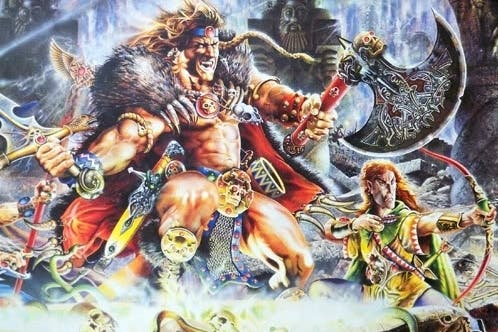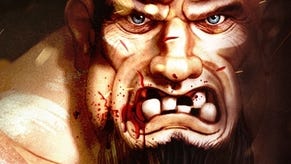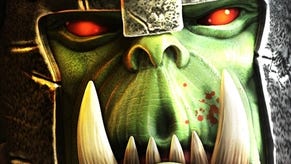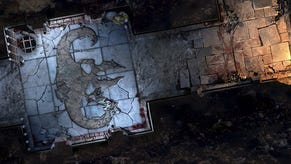Warhammer Quest review
Dice hard.
The roll of the dice is the beating heart of games. Before there were joypads, there were dice and counters and boards, and random chance trumped player skill every time. Nobody won Snakes & Ladders through superior tactics, and even in later board games where strategy was possible, picking the wrong card or rolling the wrong total could still unravel your best-laid plans.
It is, much like life itself, blatantly unfair. Your hopes and dreams crushed without a thought because a battery of tiny variables - the speed of a hand, the contours of a fingertip at the point of release, the flow of air over tumbling cubes, the microscopic divots and peaks of a table top - all conspire to deliver a one instead of a six.
Warhammer Quest feels a lot like that, which is unsurprising since it's an iPad adaptation of a board game. A fairly obscure 1995 Games Workshop board game at that, but one that seems - on the surface, at least - like a perfect candidate for the tablet experience. As developed by Rodeo Games, Warhammer Quest is a fast-paced, turn-based dungeon crawler in which your goal is no loftier than the accumulation of riches and experience (which you use to become stronger in order to loot more riches).
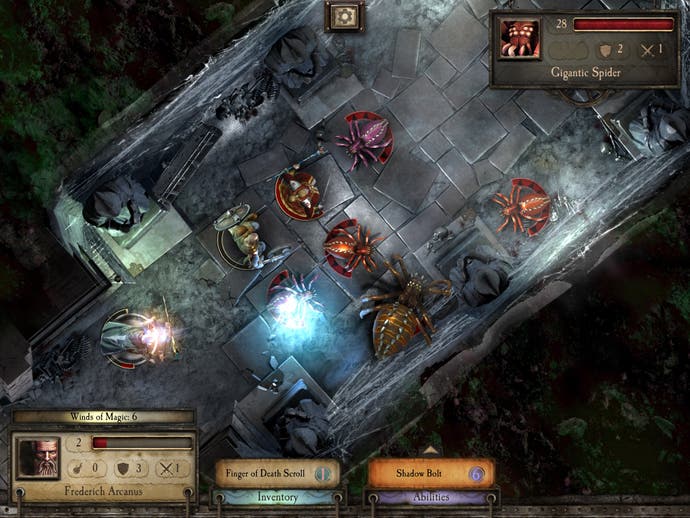
So you plunge into dungeon after dungeon, controlling your four characters using a simple and intuitive control scheme. Tap to select, tap to move, tap to attack. You don't have to wait for one character to finish moving before selecting someone else, so you can guide your quartet down the narrow corridors quickly and easily. The map fills in chunk by chunk, revealing the next areas along with whatever enemies lurk within it, only once you move a character up to the arrows that lead you onwards. Sometimes the path will diverge and lead to a maddeningly pointless dead end, but this isn't a game where you'll get lost. Once you're down in the dungeons, it's much as Yazz promised: the only way is up.
It all looks fantastic as well, with richly detailed - if inevitably repetitive - environments and appealing characters, even if you only ever see the tops of their heads. The screen is kept nicely uncluttered too. The game plays with the iPad in landscape mode, while the inventory appears when you flip it to portrait. It's a nice touch at first, but one that becomes a little more annoying and inconvenient every time you have to do it.
For all its small pleasures, Warhammer Quest keeps tripping over its origins. The game keeps its stat-rolling hidden lest the sight of numbers scare off new players. This streamlines the play but also renders it distractingly opaque. Characters swing and miss their target with irritating frequency, but you'll have no idea why since you never knew the odds in the first place. As you don't know which stats are being rolled against, you're essentially making all of your important combat choices blind. The in-game journal sheds a little light on the mechanisms at work behind the scenes, but the information is poorly presented.
Combat is tough as well. One good strike can take away half a character's hit points, and the game loves to spawn additional enemies right in your midst while you're still dealing with a previous attack. Once you start coming up against boss enemies that can demolish a character in one strike, success starts to rely more on luck than skill.
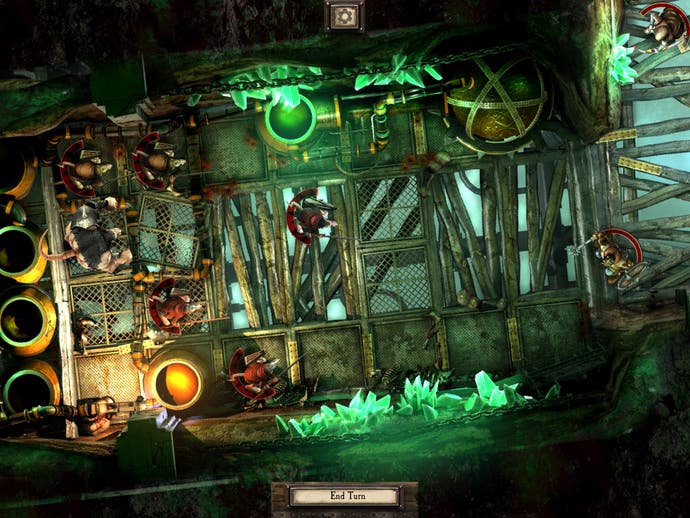
Inventory management is also compromised, with your backpack off limits once a fight has begun and the available slots for useful items limited to just four. Given that at least two of those will likely be taken up by weapons and armour, you don't get a lot of room to plan ahead. There are actually 12 inventory slots, but eight are reserved for rare items. The frustration of having empty spaces and ample bandages and food to fill them, yet being unable to access these life-saving objects when you need them most, is too much.
Indeed, the game's love of random chance leaves the whole thing feeling gruellingly unbalanced. Everything, from the amount of mana points available to cast a spell to the healing power of health items falls to an invisible dice roll, which means that the task ahead can either be incredibly easy or nigh impossible from one game to the next. One encounter might find you taking minimal damage and more healing than you need, the next might be the other way around. Random events also play a part, suddenly nerfing the stats of your characters with sadistic frequency. How well you play soon starts to feel distractingly irrelevant.
The problem isn't so much that everything relies on these unseen random number generators - that's role-playing for you - but that it's a system which plays very differently out of its intended context: played in real life, with friends, around the kitchen table. With a group of flesh-and-blood players, and a dungeon master to react to, each random setback or unexpected bonus prompts discussion and collaboration. The dice roll is no more fair, but it at least feels tangible, part of the natural fabric of social role-playing, where the fun really lies. On the iPad, Warhammer Quest is a strictly single-player affair, so when the game throws out endless snakes rather than ladders the communal "all in this together" aspect just isn't there. Rather than challenged, you feel bullied.
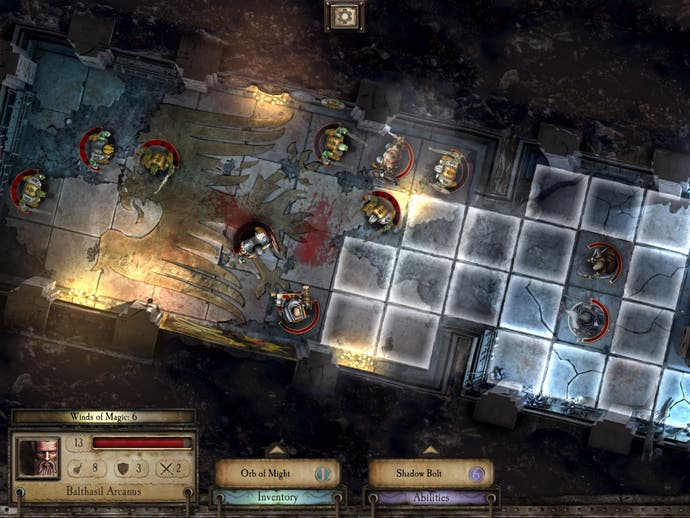
The game also makes dubious use of in-app purchases. For £2.99 you get the main game and four characters, the obligatory gang of Warrior, Dwarf, Elf and Wizard. You can pay extra for an additional campaign, which is probably fair enough, but if you want to play around with your party you need to unlock up to three extra characters at £1.99 each. You don't technically need them, but the game isn't shy about pushing them in your face at the start of every quest.
One of the first special quests you'll come across dangles the prize of some Bracers of Defiance in front of you. Naturally, this being the first promised loot of the game, you want them. It's only after finishing the quest you discover that the bracers in question are for the sole use of one of the DLC characters. It's a crude sort of bait-and-switch salesmanship, and one that starts the game with a mercenary tone.
With its moreish pace and compelling presentation there's the basis of a really great tablet RPG here, but Warhammer Quest makes two misguided assumptions that hold it back. It assumes that role-playing works better with all the dice and messy statistics brushed off the table, and it assumes that a multiplayer board game and a single-player video game are the same experience. Had it chosen differently, it might have claimed an unambiguous victory and appealed to more than just those already familiar with its rulebook. In the ruthless, random world of Warhammer Quest, that element of choice is a luxury sadly too often denied the player.
